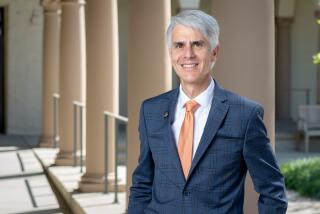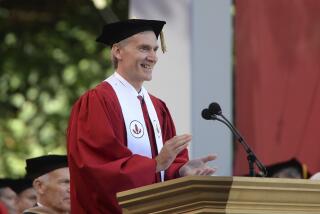USC Dean Named President of Williams College
- Share via
USC Vice President Morton Owen Schapiro, one of the nation’s leading experts on college admissions and financial aid, Tuesday was named president of Williams College in Massachusetts.
His new perch, as leader of one of America’s best liberal arts colleges, gives Schapiro a high-profile platform from which to issue his sometimes brutally honest commentary on where American colleges succeed and where they fail.
“You don’t often find a college or university president with a scholar’s view of the economics of higher education,” said William G. Bowen, a former Princeton president who now runs the Andrew W. Mellon Foundation.
“Morty is now in position to advance the general debate over the basic questions of where higher education should go, how much it should cost, who should pay for it, who should be given access.”
During his tenure at USC, Schapiro, 46, rose from chairman of the economics department to dean of the College of Letters, Arts and Sciences, USC’s biggest college, which educates about half of all USC students. Most recently, he added extra duties as vice president for planning.
“He’s an extremely talented young man and he’s done a tremendous job,” said USC President Steven B. Sample. “I felt very certain I would lose him to a presidency. It was just a question of which one and when.”
As a scholar, Schapiro, an economist who trained at the University of Pennsylvania, has long teamed with fellow economist Michael S. McPherson, the president of Macalester College in Minnesota, to write books such as the “The Financial Aid Game” and “Keeping College Affordable.”
That expertise has given Schapiro a keen insight into the financial juggling act performed by college administrators.
For example, when the nation’s college leaders recently strained to justify raising tuition twice as fast as the rate of inflation, Schapiro sliced through the rhetoric with a simple explanation: It’s supply and demand.
“People are lined up and willing to pay for a prestigious education,” Schapiro said. “If people weren’t willing to pay for it, colleges and universities would forgo these price increases.”
Ironically, Williams College earlier this month announced it would not raise its $31,250 annual total for tuition, fees and room and board next year--even though the campus turns away three out of four applicants.
The unusual move will put pressure on other highly selective institutions, which have grown increasingly uncomfortable with spiraling tuition as their endowments have soared with big donations and the booming the stock market.
Yet Schapiro and McPherson in their writings generally argue that discounting tuition across the board--a common practice at public universities--more often benefits the rich. Instead, they advocate raising tuition and diverting a larger portion of the money to financial aid for those who can least afford college.
As it stands now, more than 40% of Williams’ 2,100 students get financial aid, with packages ranging from $4,575 to $33,000.
When Schapiro becomes the 16th president of Williams on July 1, he will take the reins of an institution that is not as well-known as other small, East Coast liberal arts colleges such as Swarthmore, Amherst and Wellesley, but rivals them in every way.
Nestled in the Berkshire Hills of western Massachusetts, Williams has a rich, 207-year history, a $1-billion endowment and a rigorous academic program that attracts extraordinarily bright students. Average SAT scores for this year’s freshmen: 1,401.
This summer will mark the sixth time that Schapiro has packed up his belongings and moved between Williams and USC. Altogether, Schapiro has spent 11 years as an economics professor at Williams and eight years as a professor and administrator at USC.
“I actually love both places,” Schapiro said, “which is why I keep going back and forth.” This time, he’s moving a larger family: his wife, Mimi, and three children, including the most recent addition, Rachel, born five weeks ago.
The winner of multiple teaching awards, Schapiro said he will continue to teach economics and will focus on helping Williams “set the standard for undergraduate education.”
More to Read
Sign up for Essential California
The most important California stories and recommendations in your inbox every morning.
You may occasionally receive promotional content from the Los Angeles Times.













